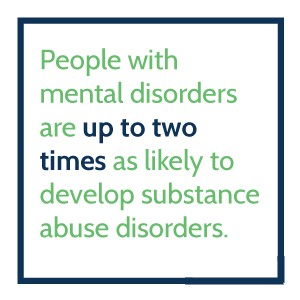How to check yourself into a hospital for mental health?
Some mental health issues can leave you feeling helpless and unable to cope. Being alone can add to the stress of dealing with mental illness and make you feel even worse. Staying at a 5-star mental health hospital or a mental health inpatient rehab is a great way to ensure that you are always around people you can trust to look out for your well-being and provide you with the support you need whenever you need it.
Because you’re undoubtedly feeling overwhelmed right now, you might want to ask the assistance of a friend or family member to check into the hospital and complete paperwork. If feasible, you or they should phone ahead to learn about the hospital’s policies and procedures and what materials you need to carry. Information about visitation hours and phone numbers will also be helpful.
The highly trained professionals at the inpatient mental health treatment centers are equipped with the knowledge and skills to get you through even the roughest stages of recovery.

When should I go to hospital for mental health?
Remember that a mental health hospital is appropriate whenever you need a safe place to receive intensive treatment until your symptoms stabilize. You should also consider checking yourself into a mental health hospital when:
- You have severe depressive symptoms
- You are thinking about killing yourself or others
- If your current therapy isn’t working
- You’re finding yourself too ill to eat, bathe, or sleep properly
- Your doctor may recommend a mental health hospitalization when making significant changes in your treatment plan that require close supervision.
The steps to getting a diagnosis include:
- A medical history
- A physical exam and possibly lab tests if your provider thinks other medical conditions could be causing your symptoms
- A psychological evaluation. You will answer questions about your thinking, feelings, and behaviors.
We Level Up mental health treatment supports various mental health conditions and other challenges such as dual diagnosis. Each page includes resources, information on treatment options, and more.
Get Help. Get Better. Get Your Life Back.
Searching for Accredited Drug and Alcohol Rehab Centers Near You?
Even if you have failed previously and relapsed, or are in the middle of a difficult crisis, we stand ready to support you. Our trusted behavioral health specialists will not give up on you. When you feel ready or just want someone to speak to about therapy alternatives to change your life call us. Even if we cannot assist you, we will lead you to wherever you can get support. There is no obligation. Call our hotline today.
(844) 597-1011What happens if you go to hospital for mental health?
One of the first things that will happen is that a psychiatrist will evaluate you to determine an appropriate treatment plan to meet your specific needs. Your mental health treatment plan will likely involve working with a variety of mental health professionals, including:
- Psychiatrist
- Clinical psychologist
- Nurses
- Social workers
- Activity and rehabilitation therapists
You will most likely participate in individual, group, or family therapy during your stay. In addition, you will probably receive one or more psychiatric medicines. The hospital staff will also handle obtaining clearance from your insurance provider for your visit. Your rehab insurance company will examine your progress throughout your stay to decide if you require more hospital time.
Potential Advantages
- Mental health hospital programs are entirely focused on recovery
- Mental health hospitals or inpatient programs ensure regulated access to food and other substances that may present difficulties for the patient
- Mental health programs help patients avoid exposure to triggers that may provoke eating disorder behaviors
- Mental health inpatient treatment programs are staffed by fully qualified staff that is available 24/7
- Mental health programs allow patients to engage in therapy every day
- Accredited mental health hospital programs include multiple types of therapy
- Mental health hospital programs are focused on emotional safety
While you are at the hospital, you also have the right to:
- Be thoroughly briefed about all tests and treatments you will be receiving, including the risks and benefits
- Refuse any tests or treatments that you feel are unnecessary or unsound
- Decline to participate in experimental therapy or training sessions involving students or observers
Except for your insurance company, no one will be told about your hospitalization or inpatient treatment without your permission. [1]

Potential Disadvantages
Most of those who need mental health care worldwide lack access to high-quality mental health services. Stigma, human resource shortages, fragmented service delivery models, and lack of research capacity for implementation and policy change contribute to the current mental health treatment gap.

Get Your Life Back
Find Hope & Recovery. Get Safe Comfortable Detox, Addiction Rehab & Dual Diagnosis High-Quality Care.
Hotline(844) 597-1011How long is an inpatient stay?
The effects of mental disorders range from mild to severe to life-threatening. Fortunately, many people with mental illnesses can be successfully treated with talk therapy or medication-assisted treatment. In general, 30 days is the maximum time for inpatient treatment in a hospital-based mental healthcare program. However, treatment at a residential mental health facility usually extends for a minimum of 90 days and as long as six months or more.
More than one in four adults living with serious mental health problems also has a substance use problem. [2] Dual-diagnosis treatment is critical for client success. And can improve client treatment recovery outcomes significantly. For many suffering from addiction and related mental health problems, underlying co-occurring corresponding illnesses trigger addictive behaviors. Clients suffering from addiction often self-medicate their emotional pain through drug and alcohol abuse.
Someone with a dual diagnosis must treat both conditions. You need to stop using alcohol or drugs for the dual diagnosis treatment to be effective. Treatments may include behavioral therapies and medications. Also, support groups can give you emotional and social support. A typical progression for someone with a severe substance use disorder might start with 3 to 7 days in a medically managed withdrawal program, followed by a 1- to 3-month intensive drug rehab in a residential treatment program, followed by continuing care for long-term sobriety.

Mental health and substance use disorders affect people from all walks of life and all age groups. These illnesses are common, recurrent, and often severe but treatable, and many people recover. Mental disorders involve changes in thinking, mood, and behavior. These disorders can affect how we relate to others and make choices. Reaching a level that can be formally diagnosed often depends on a reduction in a person’s ability to function due to the disorder.
First-class Facilities & Amenities
World-class High-Quality Addiction & Mental Health Rehabilitation Treatment
Rehab Centers TourRenowned Addiction Centers. Serene Private Facilities. Inpatient rehab programs vary.
Addiction Helpline(844) 597-1011Proven recovery success experience, backed by a Team w/ History of:
15+
Years of Unified Experience
100s
5-Star Reviews Across Our Centers
10K
Recovery Success Stories Across Our Network
- Low Patient to Therapist Ratio
- Onsite Medical Detox Center
- Comprehensive Dual-Diagnosis Treatment
- Complimentary Family & Alumni Programs
- Coaching, Recovery & Personal Development Events
What happens after I leave the mental health hospital?
Your doctor may prescribe a day-treatment program once you are discharged from the mental health hospital. Many of the benefits you got during your mental health hospital visits, such as psychotherapy and other treatments, will be available through this program and the ability to return home at night and on weekends.
When you are released, it is critical that you understand how to continue your therapy after you leave the mental health hospital. Make sure to discuss your discharge plan with your healthcare professionals.
If you feel comfortable and need assistance, request the assistance of friends, family, or trusted loved ones to assist you in carrying out your plan. Their aid might range from driving you to appointments to simply listening to you. You may also direct them to resources to assist someone suffering from depression.
World-class, Accredited, 5-Star Reviewed, Effective Addiction & Mental Health Programs. Complete Behavioral Health Inpatient Rehab, Detox plus Co-occuring Disorders Therapy.
CALL(844) 597-1011End the Addiction Pain. End the Emotional Rollercoaster. Get Your Life Back. Start Drug, Alcohol & Dual Diagnosis Mental Health Treatment Now. Get Free No-obligation Guidance by Substance Abuse Specialists Who Understand Addiction & Mental Health Recovery & Know How to Help.
Mental Health Hospitals Near Me
We Level Up Treatment Center provides world-class care with round-the-clock medical professionals available to help you cope. All are working as a team providing mental health programs and other aspects of mental health hospital treatment. Make this your opportunity to reclaim your life.
There are many paths to addressing psychiatric disorders because mental health hospitals and inpatient treatments are now being personalized. We Level Up rehab centers offer approaches and therapies tailored to each client. Moreover, some mental health hospitals or inpatient rehabs used to manage this condition and dual-diagnosis needs include:
We Level Up treatment centers are using different CBT techniques, exploring automatic negative thoughts and catastrophic language and how to change negative thought processes for a more positive outcome and a better response to the situation.
It is a counseling approach designed to help clients find the motivation to make a positive behavior change. This client-centered approach is efficient for individuals who have mixed feelings about changing their behavior.
The facilitator uses lessons on co-dependency, enabling and continued methods to identify family systems perspectives; Satir modeled overlay with role identification in the family unit and how to heal the family system. Mental health hospital family therapists and additional clinicians offer opportunities for family therapy on “face time”/zoom, as addiction and mental health concerns are family issues affecting the entire dynamic.
DBT incorporates four skills to help individuals overcome their unhealthy behaviors and distressing thoughts. Each set of skills has unique characteristics that help clients better understand their emotions.
The facilitator completes a 6-week rotation of various exercises on “getting to know myself”; focuses on differences between perception and authentic self and the dangers of living in a dichotomy; works on positive self-imagery, and utilizes excerpts from The Four Agreements to assist in remaining positive and focused on self.
SFBT focuses on finding solutions in the present time and exploring one’s hope for the future to find quicker resolution of one’s problems. This method takes the approach that you know what you need to do to improve your own life and, with the appropriate coaching and questioning, are capable of finding the best solutions.
Experience Transformative Recovery at We Level Up Treatment Centers.
See our authentic success stories. Get inspired. Get the help you deserve.
Start a New Life
Begin with a free call to an addiction & behavioral health treatment advisor. Learn more about our dual-diagnosis programs. The We Level Up Treatment Center Network delivers recovery programs that vary by each treatment facility. Call to learn more.
- Personalized Care
- Caring Accountable Staff
- World-class Amenities
- Licensed & Accredited
- Renowned w/ 100s 5-Star Reviews
We’ll Call You
We Level Up Mental Health Treatment Center
When the pain of emotional trauma, depression, or anxiety becomes too much, drug and alcohol abuse can often result. That’s why genuinely comprehensive and science-based programs will treat the underlying mental health issues causing the addictive behaviors often seen in treatment. Moreover, We Level Up addiction, and mental health specialists follow evidence-based best practices, improving recovery success following dual-track treatment models.
We Level Up’s commitment to advancing evidence-based programs, track record of verified licensure, and nationally recognized accreditation prove you’re in the right place to recover. We’re providing top-notch evidence-based therapies treating mental health symptoms like depression, anxiety, trauma, stress, bipolar, anxiety, and many other conditions. To employ targeted psychotherapy treatment, your entire treatment team will work together to unlock your emotional pain, stress, anxiety, depression, and traumas.
We’re Ready – When You Are! Call Now.
Our hotline is available 24/7 to assist you and your loved ones. Call Now!
We Level Up centers employ truly attentive staff that care for our client’s recovery success. Your trained team members work around the clock to ensure client safety, comfort, participation, and connection to your peer community and treatment therapists. You’ll be cared for by medical doctors, nurses, therapists, and techs. Each trained specialist is dedicated to your recovery success. We employ continuous management and staff training to enhance the patient experience, driving improved client satisfaction and recovery success.
Integrated Detox Rehab plus Mental Health Programs
- Fully Licensed & Accredited
- Most Insurance Accepted
- Confidential & Private
- Long-Term Residential Inpatient Rehab
- Free & no obligation consultations with 24/7/365 Help Line
Our team is here to answer any questions you may have about addiction and recovery. We can help get your loved ones the addiction treatment they need.
We Level Up rehab center has crafted a peaceful refuge with powerful evidence-based treatment for those suffering from addiction and mental health problems. Here, you can step away from it all, focus on yourself, and truly begin to heal from addiction and underlying mental health issues. The We Level Up mental health treatment center offers unique scenic, tranquil and comfortable recovery facilities.
The We Level Up mental health treatment center can help with a primary inpatient program. Depending on the extent of co-occurring behavioral disorders such as depression & addiction, we can first help assess your condition and guide you to suitable treatment options. We treat all behavioral health disorders to improve long-term recovery outcomes, including their corresponding secondary illnesses. We do not offer PHP, IOP, or outpatient level of care at this time. Programs, services, and mental health hospital treatments vary. Call to learn more.
Sources:
[1] Londoño-McConnell A, Larson S. Protecting your privacy: Understanding confidentiality. American Psychological Association website.
[2] Mental Health and Substance Use Co-Occurring Disorders – U.S. Department of Health & Human Services


